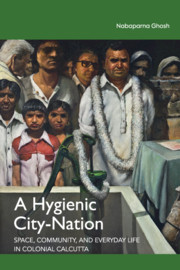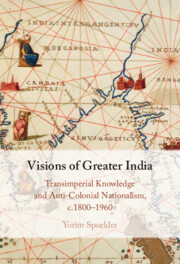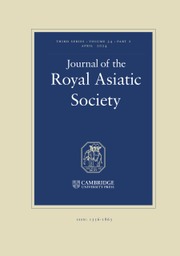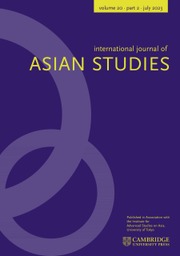
A Hygienic City-Nation
Space, Community, and Everyday Life in Colonial Calcutta
$99.99 (C)
- Author: Nabaparna Ghosh, Babson College, Wellesley, USA
- Date Published: December 2020
- availability: Available
- format: Hardback
- isbn: 9781108489898
$
99.99
(C)
Hardback
Other available formats:
eBook
Looking for an examination copy?
This title is not currently available for examination. However, if you are interested in the title for your course we can consider offering an examination copy. To register your interest please contact [email protected] providing details of the course you are teaching.
-
Calcutta, the centre of British imperial power in India, figures in scholarship as the locus of colonialism and the hotbed of anti-colonial nationalist movements. Yet, historians have largely ignored how the city shaped these movements. A Hygienic City-Nation is the first academic work that examines everyday urban formations in the colonial city that informed the broad global forces of imperialism, nationalism, and urbanism, and were, in turn, shaped by them. Drawing on previously unexplored archives of the Calcutta Improvement Trust and neighbourhood clubs, the author uncovers hidden stories of the city at the everyday level of neighbourhoods or paras, where kinship-like ties, caste, religion, and ethnicity constituted new urban modernity. Ghosh focuses on an emergent discourse on Hindu spatial hygiene that powered nationalist pedagogic efforts to train city dwellers in conduct fit for the city-nation. In such pedagogic efforts, upper-caste Bengalis were pitted against the lower-caste working poor and featured as ideal inhabitants of the city: the citizen.
Read more- This is the first academic monograph on the everyday spaces of colonial Calcutta's neighbourhoods or paras
- The book explains urbanization as a pedagogic process that targeted both spaces and bodies in the city
- It points to the conflation of urbanism and nationalism in nationalist (Swarajist) discourses on public health and the city
Reviews & endorsements
'Nabaparna Ghosh’s A Hygienic City-Nation is an important and timely work, bringing the long historical project of Hindu nation formation down to the neighborhood level. Deeply researched and lucidly presented, it shows how a regime of upper caste Bengali spatial dominance determined the urbanization process in colonial Calcutta. The work is especially commendable for moving past accounts of colonial power as totalizing – as it shows, very modern logics drove Bengali upper caste Hindus to appropriate colonial discourses of sanitation and hygiene. Ultimately, colonial discourses of sanitation were domesticated into Calcutta’s neighborhood setting for an anti-Dalit and anti-Muslim urban consolidation of local, regional, and national power.' Sheetal Chhabria, Connecticut College
See more reviews'Nabaparna Ghosh's important new work is a critical study of how the Hindu elite in Calcutta responded to and qualified urban regulation by the colonial state, generating an alternative Hindu spatial and hygienic order, politicizing informal spaces like the para (neighbourhood). A fascinating and engaging account, this book extends the frontiers of urban and Calcutta studies in many significant ways.' Partho Datta, Jawaharlal Nehru University
'An account that weaves an extraordinary tale out of the ordinary - a dense narrative of privies, contests over land, neighbourhood clubs and community festivals - painstakingly culled from reports, law suits, photographs, memoirs and a deep understanding of the communities inhabiting Calcutta in the late 19th and early 20th centuries. This is a conscious departure from the conventional reading of the archive that offers new perspectives on the colonial city, by shifting the focus onto its residents. By showing the intimate connection between health and sanitation and the articulation of citizenship, Ghosh enters the intense debate between the colonial imperative to introduce uniform civic regulations on the one hand and the dictates of custom and tradition for the residents on the other. The study also offers a history from below of nation-building in the everyday spaces of paras or neighbourhoods. The emerging discourses of health and hygiene within middle class neighbourhoods, Ghosh argues, inscribed competing claims on citizenship and leadership for Bengalis. Hygiene, as she shows, made for hierarchies – moral, material and social – not only between the colonials and colonised, but also within indigenous society. This is a new way of looking at the city, beyond town plans, built environment, maps and statistics. It places the lived experiences of the city’s residents at the heart of urbanity, defining both its possibilities and its limits.' Anindita Ghosh, University of Manchester
'This fascinating study makes an important contribution to the historiography of urban South Asia. Through a careful reading of a range of sources, Nabaparna Ghosh shows how Indians shaped urban spaces and practices in colonial Calcutta. In the process, her book offers illuminating insights into the making of India's urban modernity.' Prashant Kidambi, University of Leicester
'Nabaparna Ghosh’s A Hygienic City-Nation is a critical addition to the literature on cities under colonialism. This fascinating book complicates ideas about the control of the British Empire over urban space and shows that city dwellers carved out autonomous spaces in Calcutta at the neighborhood level of the para. Along the way, Ghosh demonstrates how the social group of the bhadralok began to promote specific practices of hygiene in these neighborhoods. The author illustrates how bhadralok practices came to underpin ideas of a Bengali Hindu nation and presents the city as a key site of an emerging nationalism in South Asia. In this way, A Hygienic City-Nation offers an urban history with implications far beyond the individual case of Calcutta. Ghosh’s illuminating study will resonate with historians of cities and nationalism around the world.' Joseph Ben Prestel, author of Emotional Cities: Debates on Urban Change in Berlin and Cairo, 1860–1910
'A groundbreaking study of colonial Calcutta from the perspective of its Indian neighborhoods and everyday life. Ghosh delivers skillful analysis of the gritty spaces of urban modernity and resistance, and explores the colonial spatialization of hygiene and race with fresh insight. Well written and engaging, the book is a must read for scholars of South Asian cities and global urban history in general.' Rosemary Wakeman, Fordham University
Customer reviews
Not yet reviewed
Be the first to review
Review was not posted due to profanity
×Product details
- Date Published: December 2020
- format: Hardback
- isbn: 9781108489898
- length: 236 pages
- dimensions: 237 x 157 x 20 mm
- weight: 0.44kg
- availability: Available
Table of Contents
List of Figures, Tables, and Boxes
List of Abbreviations
Acknowledgements
Introduction
1. The Black Town, Spaces of Pathology, and a Hindu Discourse of Citizenship
2. The Calcutta Improvement Trust: Racialized Hygiene, Expropriation, and Resistance by Religion
3. A City-Nation: Paras, Hygiene, and Swaraj
4. A New Black Town: Recolonizing Calcutta's Bustees
Epilogue
Glossary
Bibliography
Index.
Sorry, this resource is locked
Please register or sign in to request access. If you are having problems accessing these resources please email [email protected]
Register Sign in» Proceed
You are now leaving the Cambridge University Press website. Your eBook purchase and download will be completed by our partner www.ebooks.com. Please see the permission section of the www.ebooks.com catalogue page for details of the print & copy limits on our eBooks.
Continue ×Are you sure you want to delete your account?
This cannot be undone.
Thank you for your feedback which will help us improve our service.
If you requested a response, we will make sure to get back to you shortly.
×







